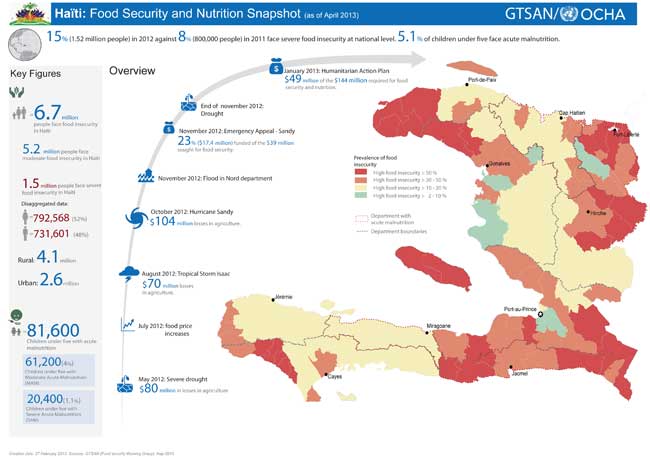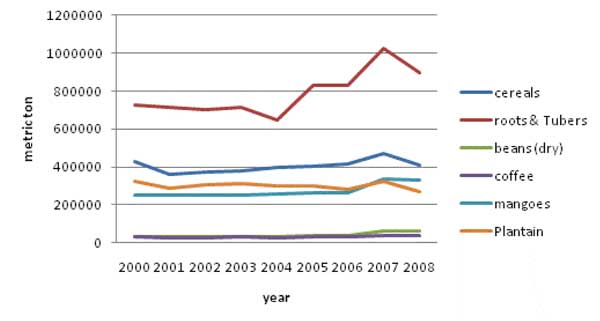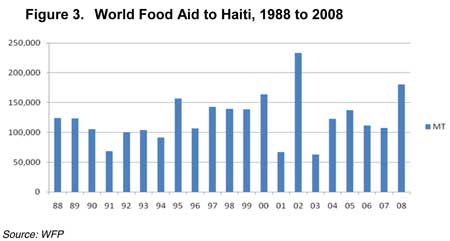Port-au-Prince, Haiti – Last May, the United Nations announced “6.7 million Haitians face food insecurity.” Aid organizations, development agencies, and the media mobilized with articles, videos, and “urgent appeals.”
Thanks to some measures, and also some good weather, the numbers have likely improved slightly since then. Recently, the Coordination Nationale de Securité Alimentaire (CNSA or National Coordination for Food Security) announced that rice and corn harvests are up from the year before. (However, they remain below previous years.)

A chart from the U.N. Office for the Coordination of Humanitarian Assistance dated April 2013 showing hunger across Haiti and alleging the causes at left – drought, food price increases, Tropical Storm Isaac, etc. The chart does not even bring up the possibility of structural causes.
Nevertheless, with terrifying charts and dire warnings, officials continue to say that in 2013, twice as many Haitians as last year – some 1.5 million people – continue to face “severe” or “acute food insecurity,” and that many millions more are considered food insecure. At least one-fifth, and in some areas, one-third, of all Haitian children are “stunted,” meaning that they are underweight, shorter than they ought to be, and the development of their brains and other organs will likely be affected.
Hunger has also become part of the political football game in Haiti.
Speaking on May 10, former President Jean-Bertrand Aristide criticized the government for not addressing the hunger problem and gave a thinly veiled warning, quoting a Haitian proverb: “When a dog is hungry, it doesn’t play around.”
President Michel Martelly responded a few days later, saying Aristide was telling “a lie” and that he is also responsible since “he spent ten years in power.” (Actually, Aristide did not spend ten years in office. Both terms were truncated by coups).
While statistically hard to verify, many reports say hunger in Haiti today is more pervasive than it has ever been in the last 50 years.
Doudou Pierre Festil, a farmer who is also member of a national peasant movement and the coordinator of a network of about 200 farmers associations and other organizations known as Réseau National Haïtien pour la Souveraineté et la Sécurité Alimentaire (RENAHSSA – National Network for Sovereignty and Food Security), says “the government is 100% responsible” for hunger in Haiti.
But the reality is more nuanced, the causes of hunger more structural.
Everyone has been aware of Haiti’s brewing food crisis for years: Haitian agronomists, economists, farmers, and government officials, foreign donors and humanitarian agencies. Over they years, Haitian and foreign “experts” have designed projects, written grants… and they have also executed contracts and been well-paid for their services.
Over the past four decades, donors have spent billions of dollars on “food aid,” “development aid,” “humanitarian assistance,” and a host of agricultural programs.
Haiti Grassroots Watch (HGW) and many others know that the causes of hunger are structural, some of them dating back to the earliest days of the republic. They are also interrelated and linked to larger economic issues in the country and in the world. While it is not possible to explore the causes in depth in this series, here is a summary of the most obvious causes.
1. Poverty. One-half of the population lives on less than US$1 per day; some three-quarters live on less than US$2 per day. With little to no buying power, Haitians who do not produce their own food do not have the income necessary to buy even basic necessities. One thing that makes Haitians poorer, a recent UN mission report noted, is that “basic social services” – like education – have to be purchased, further stressing poor households.
2. Haiti’s land tenure system and lack of correct land-management. According to Bernard Ethéart, an expert on Haitian land issues and former director of the Institut Nationale de la Réforme Agraire (INARA – the National Institute of Land Reform), Haiti’s land tenure system is a “complete disorder that has been going on for 200 years.” Ethéart claims that most land belongs to the government, because ever since independence, various dictators have stolen, illegally “sold,” or given away parcels to their families and their allies. Haiti has no land registry. In the countryside, land security is quite low because many “owners” do not have titles or have titles that are out-of-date. In addition, a great deal of farmland is either state land leased from the government, or is “owned” by large landowner (grandon) who then rents it or has sharecroppers (known as “demwatye”) work it. Thus in many cases, farmers are not invested in the land. Studies have shown that farmers working leased, rented, or share-cropped land are less likely to protect it from deforestation and other practices that weaken the soil and the environment. Another challenge is the fact that “private” land is divided into tiny plots because Haitian law says all offspring have a right to inherit a portion their parent’s land.
3. Neoliberal trade policies. The World Bank, the International Monetary Fund (IMF), and the U.S. government have pushed neoliberal economic policies on Haitian governments since the 1980s. In 1995, under pressure from Washington, the Aristide government dropped tariffs on many food products to zero or near-zero: making then the lowest tariffs in the Caribbean at that time. A 2006 Christian Aidreport noted: “[T]he results of lowering agricultural tariffs in Haiti have been disastrous.” Trade liberalization is directly linked to decreased agricultural production, increased rural poverty, an exodus from the countryside into city slums, and increasing hunger, according to Christian Aidand many other experts. The radical policies came on top of 200 years of having what Haitian economist Fred Doura calls an “extraverted” economy, which is “exploited and dominated” by foreign countries, their economies, their currencies, and their needs: first France, then the United States. In Haïti – Histoire et analyse d’une extraversion dépendent organisée, Doura says that Haiti’s dependence is cultural, technological, financial, and also economic, given that since its inception, much of the country’s production has been exported while its necessities were imported. Doura laments: “The neoliberal globalization of the economy has reinforced the vise of Haiti’s dependence.”
4. Population increase coupled with stagnant or declining agricultural output. This has taken place due to many interrelated reasons, including:
- The land tenure system.
- Decades of an overall lack of government and donor investment in agriculture. For example, during the first half of the 2000s, the Agriculture Ministry received only 4% of the budget, while agriculture and rural development accounted for only 2.5% of official development assistance. A 2009 UN mission deplored “the abandon of agricultural sector and of national production for the past three decades.” The mission also noted that the approach of the government and various organizations at the time was characterized by “multiple strategies and programs which are sometimes contradictory and by endless conferences which do not deliver any concrete results.”
- Antiquated methods and techniques, lack of access to fertilizers and improved seeds, and other challenges due to the lack of state support.
- Lack of efficient and maintained irrigation systems.
- Crop loss due to the lack of a road system that can safely and efficiently get produce to markets and/or the lack of adequate food storage facilities.
- Lack of enforcement of a tree-cutting ban, and the lack of an energy policy, which discourages charcoal as an energy source, both of which contribute to deforestation.
- Vulnerability to tropical weather events like droughts and flooding due to massive deforestation and other results of failure to manage the environment.
- Declining soil quality caused, in part, by increased run-off due to deforestation.
- Emigration of youth from farming areas due to lack of schools, other services, and economic opportunity, and the ensuing lack of farmers and farm workers in the countryside.

Graphic shows lack of increase in agricultural production during most the past decade.
5. Negative impacts from various food aid practices over the past 55 years. [See Aid or Trade?]
6. Other failures or negative results of “aid” mechanisms. The Haitian government told the UN mission that foreign donors shy away from budgetary support and that this is one of many stumbling blocks. According to the UN Office of the Special Envoy, in 2007, for example, bilateral donors gave only 3% of their aid to budget support, while multilateral donors gave only 16%. All the rest of foreign aid went to agencies and projects. Also, the 2009 UN mission criticized a decade or more of focusing on “emergencies” rather than structural causes of hunger, declining agricultural production, environmental degradation, and other linked structural issues. The mission also criticized the results of “the perverse mechanism of handouts like farmers waiting for free fertilizer, the failure to clean certain canals in the hopes that an NGO will pay for it…”

Graphic shows food aid received by Haiti from 1988 through 2008. Source: World Food Program (WFP)
7. Internal market inefficiencies, especially what one U.S. government report called “oligopolistic practices” by food importers. The rice market, for example, is dominated by three major import companies, which are controlled by three members of Haiti’s elite. A 2010 study noted that “rather than undercutting one another’s prices, Haiti’s major importers collude to agree on prices.” This results in local prices that are unnecessarily high and are sometimes much higher than on the international market. One importer admitted to the study author: “If this were the U.S., we would go to jail.”
Join us in defending the truth before it’s too late
The future of independent journalism is uncertain, and the consequences of losing it are too grave to ignore. To ensure Truthout remains safe, strong, and free, we need to raise $43,000 in the next 6 days. Every dollar raised goes directly toward the costs of producing news you can trust.
Please give what you can — because by supporting us with a tax-deductible donation, you’re not just preserving a source of news, you’re helping to safeguard what’s left of our democracy.